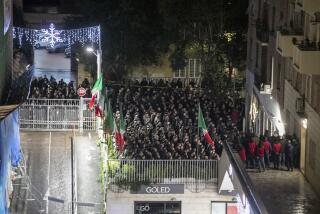Italian Fascist Party Turns Itself Into New, Conservative Force : Europe: Some skeptical, but coalition says it has abandoned allegiance to Mussolini’s ideas.
- Share via
ROME — After a nostalgic half a century, another Italian political leopard is pleased to announce that it has changed its spots: The founder and soul of Italian fascism died before a partisans’ firing squad in 1945, but not until this week did Benito Mussolini’s political descendants finally turn their back on Il Duce’s legacy.
Now, like the Communists a few years before them, Italy’s neo-fascists have voted themselves into history.
Both must persuade skeptics, but the jostling of former left- and right-wing extremists for a place in the vote-catching center has become an icon of Italian political life.
Gianfranco Fini--a polished, 43-year-old professional politician who not so long ago called Mussolini the century’s greatest statesman--was himself more statesmanlike in overseeing the death of the Italian Social Movement at a final party congress.
Founded by unabashed Mussolini fans in 1946 but forbidden by Italian law from calling itself fascist, the neo-fascist party was a 5% right-wing sideshow at the polls until Fini arrived.
Last year, he steered his party into a right-wing umbrella movement called the National Alliance and into government for the first time as a coalition partner with newcomer Silvio Berlusconi.
The Berlusconi government lasted seven months. But while the Milan media tycoon was scrapping with critics and restive allies, Fini was consolidating the centrist credentials of the National Alliance.
Today it is perhaps the country’s third-largest party, the choice of 17% of voters, according to one poll.
Fascism has been anathema to mainline Italians and their American allies since the war.
No American ambassador ever received a neo-fascist party official before Fini. He, articulate and ambitious, is by now respectable enough to be invited to the ambassadorial Fourth of July party.
Indeed, in its founding documents, Alleanza Nazionale specifically rejects totalitarianism, anti-Semitism, racism and other Mussolini precepts. It describes itself as a conservative force wed to national pride, capitalism, and law and order.
“The political right is not the son of fascism,” the party says. “The values of the right predate fascism, have accompanied it and now leave it behind. The cultural roots of the right are rooted in Italian history before, during and after the Fascist era.”
*
Can political parties with a longtime bent toward extremes persuade voters that they are truly moderate? There are pregnant questions, including: Is it conversion, or expediency?
Berlusconi, for example, said he entered politics because he foresaw a leftist victory last spring.
He said the Communists are still communist, and their rule would be ruinous for Italy and for the business empire he heads as one of Europe’s richest men.
But Berlusconi, an observer at the neo-fascists’ farewell last weekend, believes that Fini has finally led his party in from the stiff-armed cold.
Not everybody else is convinced.
“We must not forget the militancy of fascism, or the nostalgia for its past, or the contempt for democratic institutions that has been expressed by neo-fascists,” cautioned Tullia Zevi, president of an Italian Jewish community persecuted by fascism.
In a 50th anniversary year when Italians are recalling the end of World War II and the Allied victory that ended the fascist Nazi era, there are still alarming signs in Italy of right-wing violence.
Street toughs, nicknamed “Nazi skins,” have attacked African immigrants. Swastikas litter every Italian city’s graffiti. In soccer stadiums and at other sporting events, racist and anti-Semitic slogans associated with fascism are sometimes chanted or stretched as banners.
“The ultra (extremist) fans march through train stations, squares and city streets in military formation. I have seen their shaved heads and skintight jeans, have seen them raise their arms in the Nazi salute, Celtic crosses and swastikas on bands around their biceps. I have seen them and I have been afraid,” recently observed Ken Shulman, an American sports reporter in Italy for 12 years.
More to Read
Sign up for Essential California
The most important California stories and recommendations in your inbox every morning.
You may occasionally receive promotional content from the Los Angeles Times.













